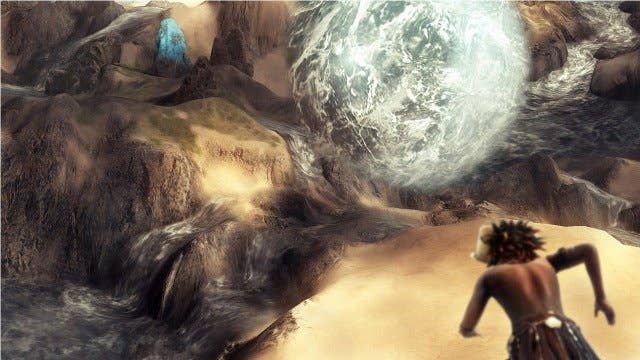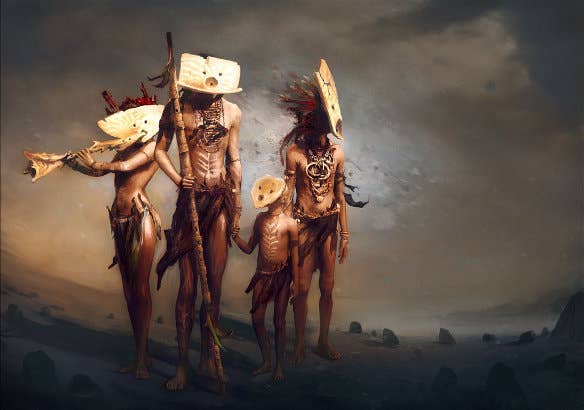Critical Consensus: From Dust
Eric Chahi's first game since Heart Of Darkness is a singular and sporadically brilliant experience
From Dust was born on the lip of an volcanic crater. Eric Chahi, the enigmatic designer of the classic Another World and the troubled Heart Of Darkness, watched as the magma boiled and steaming rocks were blasted high into the air. It was the awesome power of nature, raw and unassailable. Chahi resolved to create a videogame that captured the sense exhilaration that coursed through his body at that moment, and this is the result.
Eurogamer's Oli Welsh believes that Chahi has succeeded admirably in his goal, awarding the result an impressive 9 out of 10. From Dust is, "a different kind of God game...both more hands-on and more remote, giving only the most basic instructions to its nomadic tribe of followers while directly manipulating nature instead: shaping rivers, moulding earth and rock like putty, creating order from chaos, coaxing life from barren dust."
The player controls the Breath, an elemental force tasked with protecting a race of people as they spread across the hostile lands in search of knowledge of their lost civilisation - "nothing less than a video game creation myth... If God games should inspire awe, then From Dust towers over the petty, hand-to-mouth, human agenda of its predecessors."
Spectacle is one of the game's key strengths, with Welsh rhapsodising that first glimpse of a "titanic tsunmai" as an event to "set your hair on end." The other is the sandbox that gives rise to these sudden cataclysms, where a carefully placed mound of earth can bring disaster, and altering the flow of magma can allow life to flourish.
"Despite the levels' small size, From Dust is more of a sandbox than almost any 'open world' game, and it practically defines the concept of emergent play...It's not so much about having multiple solutions to a problem as an infinite variety of ways a single solution might play out."
The review acknowledges a handful of flaws, particularly the frustrating difficulty of the later levels, which, "occasionally reduces you to frantic to-ing and fro-ing as you try to displace as much matter as possible before the next disaster strikes - more desperate fire-fighter than mighty creator."

Ultimately, though, From Dust offers a substantial experience for relatively small cost. It's a big idea in a small package," Welsh concludes, "and it's begging to be expanded, as Ubisoft has hinted it might be. Pray that it is."
One person who will join Welsh in genuflecting before the skills of Eric Chahi and his team of mercurial programmers at Ubisoft Montpellier is IGN's Keza MacDonald. In her 8.5 out of 10 review, she displays similar enthusiasm for From Dust's simplified, almost nihilistic take on the God game.
"Unless your fantasies involve struggling pitifully against natural disaster, this is definitely not a game that caters to them," she says. MacDonald is also in awe of the game's constantly evolving world, proclaiming it "the most realistic nature simulation I've ever seen."
However, her disappointment with the game's escalating difficulty is more pronounced. Later in the game, new obstacles like exploding plants and immolating trees are added to the mix, bringing an unwelcome sense of the random with them."
"The sheer brutality of From Dust's closing levels is dispiriting. There are multiple solutions to any situation, and generally nothing that you do will irrevocably ruin your chances of succeeding, but the later maps rely more on time management (and a dash of luck) than on ingenuity. The cursor's occasional fiddliness compounds that frustration."
For MacDonald, the game is saved by context: yes, it's dificult, but as a "true struggle against the elements" that's exactly how it should be.
Games Radar's Michael Grimm is less forgiving. In a 7 out of 10 review on the US site, Grimm extols the sensation of moulding the landscape as an experience with, "no real analogue," but he raises serious concerns over the AI of the game's hapless tribespeople.
"Once you've clicked a location, the tribesmen automatically pathfind towards it, but even slight variations in elevation will cause them to abandon a route entirely... Being able to manually set paths for the tribesmen, or at least move them closer to their destinations, would have helped to overcome the irksome later levels."
This plays into the harsh difficulty of the later levels, which Grimm believes rely too heavily on trial and error and expose weaknesses in the control scheme.
"The final 5 maps all required numerous restarts after 30 or 40 minutes of play, and by the end of the game I just expected the first few dry runs to be hopeless reconnaissance."
"The irritating nature of the final levels is exacerbated by the game's control scheme, which is fine for for the most part, but struggles to cope with the precision and speed required for the final levels. I constantly found myself grabbing the wrong element in times of need, the targeting reticule autoselecting a tiny puddle of water I couldn't see, or one of the microscopic trees that litter the later levels."
Joystiq's Justin McIlroy takes a different approach, starting his review by tackling the weighty questions posed by the game's design.

"Why does God let bad things happen?" he asks. "It's perhaps the toughest question for people of faith to answer. How is it that a loving deity, who cares equally about all his creations, let some of them suffer so terribly?"
"For whatever strengths or faults it has, From Dust has allowed me to find the answer to this most vexing of issues. I would like to share that answer with you now: God lets bad things happen because he honestly forgot he put the exploding tree there."
McIlroy's opening gambit is a neat summation both the wonder and the annoyance of From Dust: a daring and occasionally awesome experience that seems intent on undermining its own achievements with pointless frustrations.
"From Dust looks and feels different from anything I've played before and, for a while, that was enough. But before long, I began to feel a sneaking kinship with Aladdin's genie, whose enjoyment of his phenomenal cosmic power was tempered only by his itty-bitty living space."
"My confinement wasn't so much physical as it was a feeling of being hemmed in by the design choices that creator Eric Chahi and team have made, which seem dead set at every turn on ruining the fun of being a god."
The reasoning is familiar: poor AI pathfinding, imprecise controls, rapidly changing stakes that leave you little chance to react, the necessity of trial and error in the latter half of the game.
"There are so many moving parts here that it's almost impossible to know where it is you went wrong. Are you trying the wrong solution? Are you trying the right solution, but not well enough? Have you figured out the solution but are now 20 minutes too late to implement it? And should you do this stupid level again and just pray you don't leave any exploding trees laying around?"
"The creativity that your powers inspire (the creativity, in fact, that the game's themes seemingly celebrate) is discouraged at every turn by difficulty, long levels, bad AI and random disasters. Like an overbearing parent, From Dust doesn't want you to play, it wants you to succeed, to progress."








